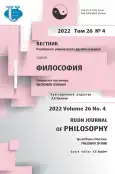Разум как машина: влияние механицизма на концептуальные основания компьютерной метафоры
- Авторы: Барышников П.Н.1
-
Учреждения:
- Пятигорский государственный университет
- Выпуск: Том 26, № 4 (2022): ФИЛОСОФИЯ СОЗНАНИЯ
- Страницы: 755-769
- Раздел: ФИЛОСОФИЯ СОЗНАНИЯ
- URL: https://journal-vniispk.ru/2313-2302/article/view/325291
- DOI: https://doi.org/10.22363/2313-2302-2022-26-4-755-769
- ID: 325291
Цитировать
Полный текст
Аннотация
В данной статье речь пойдет о механистических истоках компьютерной метафоры, формирующей концептуальный каркас для методологии когнитивных наук, ряда областей искусственного интеллекта и философии сознания. Связь истории вычислительной техники с теорией познания выражается через метафорические словари философского дискурса той или иной эпохи. Концептуальное прояснение этой связи и обоснование механистических компонентов компьютерной метафоры - основная цель исследования. Обосновывается утверждение, что изобретение механических вычислительных устройств, имея долгую историю в европейской инженерной традиции, сформировало предпосылки для зарождения машинного функционализма в современной философии сознания. Идея множественной реализации вытекает из принципа, согласно которому формальная символьная система предписывает правила использования рассудочных абстракций через физическую архитектуру вычислительного механизма. В статье рассмотрены причины концептуального смещения и раскрыты семантические основания метафорического переноса свойств абстрактных объектов из теории автоматов в область современной философии сознания. Проанализирована критика и способы защиты философской программы машинного функционализма путем изменения содержания метафоры «Разум есть машина». Также раскрыты и объяснены причины устойчивости информационно-компьютерного подхода в когнитивных науках.
Об авторах
Павел Николаевич Барышников
Пятигорский государственный университет
Автор, ответственный за переписку.
Email: pnbaryshnikov@pglu.ru
ORCID iD: 0000-0002-0729-6698
доктор философских наук, профессор кафедры исторических, социально-философских дисциплин, востоковедения и теологии
Российская Федерация, 357532, Пятигорск, Ставропольский край, пр. Калинина, 9Список литературы
- Sternberg RJ. Metaphors of mind. Cambridge: Cambridge University Press; 1990.
- Vallianatos EG. The antikythera mechanism. The story behind the genius of the Greek computer and its demise. Universal Publishers; 2021.
- Sokolovskij Y. Cybernetics of the present and future. About “reasonable” machines, artificial sense organs, automatic translation of books, mathematical logic and physiology of nervous activity. Kharkiv: Har’kovskoe knizhnoe izdatel'stvo; 1959. (In Russian).
- Miłkowski M. From Computer Metaphor to Computational Modeling: The Evolution of Computationalism. Minds and Machines. 2018;28(3):515—541. https://doi.org/10.1007/s11023-018-9468-3
- Baryshnikov PN. Metaphorical foundations of computationalism in cognitive sciences and philosophy of mind. Filosofija nauki i tehniki. 2018;23(2):61—72. https://doi.org/10.21146/2413-9084-2018-23-2-61-72 (In Russian).
- Seung S. Connectome. How the brain's wiring makes us who we are. Boston: Mariner Books; 2013.
- Ifrah G. The universal history of computing: from the abacus to the quantum computer. — New York: Wiley; 2001.
- Boden MA. Mind as machine. A history of cognitive science. Oxford: Clarendon Press; 2008.
- Baryshnikov PN. Computational models of the mind: from code to sense. Moscow: URSS, 2022. (In Russian).
- Bonner A. What was Llull up to? In: Transformation-Based Reactive Systems Development. ARTS 1997. Lecture Notes in Computer Science / M. Bertran, T. Rus. Berlin, Heidelberg: Springer; 1997. pp. 1—14.
- Shilov V. On the way to artificial intelligence: Logic machines and their creators. Moscow: LENAND; 2019. (In Russian).
- Börger E. Complexity of logical decision problem; an introduction. In: Corsi G, Dalla Chiara ML, Ghirardi GC, editors. Bridging the gap. Philosophy, mathematics, and physics: lectures on the foundations of science. Dordrecht: Springer Science; 2005. pp. 71—86.
- Leibniz GW. Letters and essays on chinese philosophy and the binary number system. Moscow: IF RAN, 2005. (In Russian).
- Neuman fon J. General and logical theory of automata. In: Can a machine think? (A. Turing). Moscow: Gosudarstvennoe izdatel'stvo fiziko-matematicheskoj literatury; 1960. P. 39—65. (In Russian).
- Fraile A., Panagiotakis E, Christakis N, Acedo L. Cellular Automata and Artificial Brain Dynamics. Mathematical and Computational Applications. 2018;23(4):75. https://doi.org/10.3390/mca23040075.
- Wolfram S. A new kind of science. Champaign, ILL: Wolfram Media; 2002.
- Rescorla M. The Computational Theory of Mind. In: The Stanford Encyclopedia of Philosophy. Edward N. Zalta: Metaphysics Research Lab, Stanford University; 2017.
- Putnam H. Is semantics possible? Metaphilosophy. 1970;1(3):187—201. https://doi.org/10.1111/j.1467-9973.1970.tb00602.x.
- Bechtel W. Mental Mechanisms. New York: Routledge; 2008.
- Epstein R. The empty brain. Your brain does not process information, retrieve knowledge or store memories. In short: your brain is not a computer. 2016. Available from: https://aeon.co/essays/your-brain-does-not-process-information-and-it-is-not-a-computer.
Дополнительные файлы









